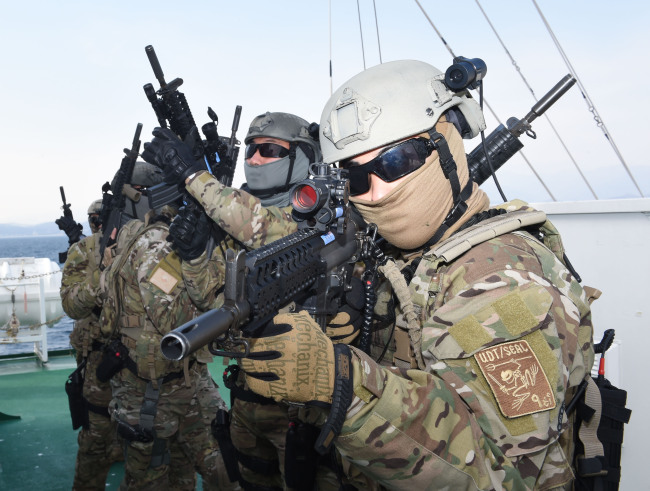South Korea is tightening its guard against possible terrorist strikes from the North, placing focus on cyberattacks and assassination of high-ranking North Korean defectors here, according to the government Friday.
The police have recently upgraded security measures for Ko Young-hwan, a North Korean defector and vice president of the state-run Institute for National Security Strategy, sources said.
The number of round-the-clock armed guards assigned to him was increased from two to eight, and his protection was raised to the highest level.
This move came in response to reports that the North Korean regime has ordered his assassination. Ko defected to South Korea in 1991 after serving as a North Korean diplomat at the North’s embassy in Congo.
“I have received threats before, but never has the alert level been this strong,” Ko reportedly told Yonhap.
“It seems that this time, (North Korea) has signaled an actual assault, not just an intimidating threat.”
South Korea’s spy agency National Intelligence Service said Thursday that North Korean leader Kim Jong-un had ordered greater preparations for terrorist attacks on the South.
The Reconnaissance General Bureau, the North’s intelligence body, is said to be gearing up for cyberattacks on key South Korean websites, physical assaults against government figures and North Korean defectors and explosive attacks in public facilities.
The most plausible scenario is a string of cyberattacks on government, media, and financial companies’ websites, officials said.
“Having performed a nuclear and missile test in January-February, North Korea is highly likely to perform cyberattacks in March-April, before its national party convention slated for May,” the ruling Saenuri Party’s Rep. Lee Cheol-woo said Friday in a radio interview.
He pointed out that it has been the usual practice for the North over the past years to first initiate a military provocation and then move on to cyberattacks in the following months.
As the party’s representative for the parliamentary information committee and a former senior official at the NIS, Lee is recognized as an expert in North Korean affairs and intelligence issues.
It is amid such concerns that South Korea’s military recently upgraded its Information Operation Condition, a five-tier warning system against computer network attacks.
The level, which had been raised from the lowest level five to four after Pyeongyang’s nuclear test in January, was further raised to level three earlier this month, following the North’s ballistic missile launch.
The police have recently upgraded security measures for Ko Young-hwan, a North Korean defector and vice president of the state-run Institute for National Security Strategy, sources said.
The number of round-the-clock armed guards assigned to him was increased from two to eight, and his protection was raised to the highest level.
This move came in response to reports that the North Korean regime has ordered his assassination. Ko defected to South Korea in 1991 after serving as a North Korean diplomat at the North’s embassy in Congo.
“I have received threats before, but never has the alert level been this strong,” Ko reportedly told Yonhap.
“It seems that this time, (North Korea) has signaled an actual assault, not just an intimidating threat.”
South Korea’s spy agency National Intelligence Service said Thursday that North Korean leader Kim Jong-un had ordered greater preparations for terrorist attacks on the South.
The Reconnaissance General Bureau, the North’s intelligence body, is said to be gearing up for cyberattacks on key South Korean websites, physical assaults against government figures and North Korean defectors and explosive attacks in public facilities.
The most plausible scenario is a string of cyberattacks on government, media, and financial companies’ websites, officials said.
“Having performed a nuclear and missile test in January-February, North Korea is highly likely to perform cyberattacks in March-April, before its national party convention slated for May,” the ruling Saenuri Party’s Rep. Lee Cheol-woo said Friday in a radio interview.
He pointed out that it has been the usual practice for the North over the past years to first initiate a military provocation and then move on to cyberattacks in the following months.
As the party’s representative for the parliamentary information committee and a former senior official at the NIS, Lee is recognized as an expert in North Korean affairs and intelligence issues.
It is amid such concerns that South Korea’s military recently upgraded its Information Operation Condition, a five-tier warning system against computer network attacks.
The level, which had been raised from the lowest level five to four after Pyeongyang’s nuclear test in January, was further raised to level three earlier this month, following the North’s ballistic missile launch.

The military is also preparing for direct military aggressions.
The Navy and Marine forces carried out a joint drill in the East Sea on Thursday, under the assumption that a North Korean warship kidnapped a South Korean civil ship. The Army, too, conducted a joint drill with the U.S. troops on Friday, working on promptly dispatching the U.S. forces to the Korean Peninsula during contingencies, officials said.
Meanwhile, the ruling conservative party quoted the growing inter-Korean tensions to push for passing the terrorism prevention bill, which has been pending at the National Assembly for months due to opposition resistance.
“The risk of terrorist attacks is very much tangible, which is why it is crucial to pass the terrorism prevention bill urgently,” said the party’s floor leader Rep. Won Yoo-chul.
The main opposition The Minjoo Party of Korea claims that the disputed bill would bestow the spy agency with excessive investigation authority and thus infringe on the people’s rights to privacy.
By Bae Hyun-jung (tellme@heraldcorp.com)
-
Articles by Korea Herald


![[Exclusive] Korean military set to ban iPhones over 'security' concerns](http://res.heraldm.com/phpwas/restmb_idxmake.php?idx=644&simg=/content/image/2024/04/23/20240423050599_0.jpg&u=20240423183955)




![[Pressure points] Leggings in public: Fashion statement or social faux pas?](http://res.heraldm.com/phpwas/restmb_idxmake.php?idx=644&simg=/content/image/2024/04/23/20240423050669_0.jpg&u=)

![[Herald Interview] 'Amid aging population, Korea to invite more young professionals from overseas'](http://res.heraldm.com/phpwas/restmb_idxmake.php?idx=644&simg=/content/image/2024/04/24/20240424050844_0.jpg&u=20240424200058)









